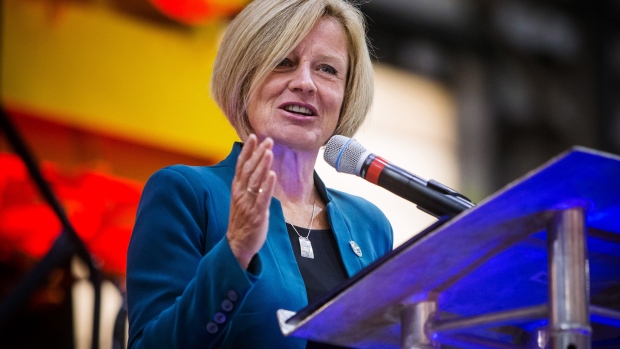Dec 2, 2018
Alberta Orders Unprecedented Production Cut to Ease Crude Crisis
, Bloomberg News

(Bloomberg) -- Alberta has ordered oil producers in the province to curtail output by 325,000 barrels a day, an unprecedented step to ease a crisis in the Canadian energy industry.
The plan announced Sunday will reduce production of raw crude and bitumen by 8.7 percent starting in January until the levels of excess oil in storage are drawn down. The reduction would then drop to 95,000 barrels a day until the end of next year at the latest.
Premier Rachel Notley is following the advice of producers that have been hammered by record low prices for heavy Canadian crude, brought on by surging oil-sands output, a shortage of pipeline space and heavy U.S. refinery maintenance. The dismal prices -- which at one point were $50 a barrel less than U.S. grades -- already had caused some producers to reduce production on their own, slash dividends and delay next year’s drilling plans.
“Every Albertan owns the energy resources in the ground, and we have a duty to defend those resources,” Notley said in a statement. “But right now, they’re being sold for pennies on the dollar. We must act immediately, and we must do it together.”
The amount being cut is more than the total production of each of OPEC’s three smallest members: Equatorial Guinea, Gabon and the Republic of Congo.
Government Revenue
The curtailment plan, which will apply to both oil-sands and conventional producers, should narrow the discount between Western Canada Select and U.S. benchmark oil by at least $4 a barrel and add an estimated C$1.1 billion ($830 million) in government revenue in the fiscal year starting April 2019, Notley’s government said in the statement.
The measure could end earlier than the end of 2019, based on market conditions, the government said. The province expects the 325,000-barrel-a-day reduction to be in place for the first three months, while storage is drawn down to historical levels. After that, the government will work to match capacity with production. Further reductions in the curtailment are expected in the fall and winter as additional rail capacity comes online.
To protect smaller drillers, the first 10,000 barrels of a producer’s output will be exempted from the cut. Each company’s level of curtailment will be based off its six months of highest level of production over the past 12 months, according to the statement. The province expects the curtailment to affect about 25 producers.
Historical Move
The plan marks the first time the provincial government has ordered a production cut since the 1980s, and that previous move was meant to protest federal energy policies, not solely to boost prices.
However, a chorus of companies, investors and industry leaders has rallied to the idea in recent weeks, saying that no other measure could help work down the glut of oil backed up in storage as quickly. Even Notley’s main political rival -- United Conservative Party Leader Jason Kenney -- has called for a curtailment.
About the only dissenting voice has come from Canada’s integrated oil companies, whose refineries have been benefiting from the cheaper feedstock.
Notley has already taken some steps to try to help producers ship more oil to market while the industry awaits the construction of more pipelines.
Last week, she announced a plan to buy rail cars to help ship an additional 120,000 barrels of crude a day, increasing already-record levels of crude shipped by train by more than 30 percent. That plan entails running two additional trains a day, each pulling 100 to 120 cars. The system would require a total of about 80 locomotives and more than 7,000 cars.
However, it was Notley’s assurances that a decision on curtailing output was coming soon that helped boost heavy Canadian crude prices by 49 percent last week.
Even after that gain, Western Canada Select crude was trading for $29 a barrel less than U.S. benchmarks. WCS closed at $13.46 a barrel earlier this month, the lowest on record in Bloomberg data stretching back to 2008. The grade’s discount to U.S. benchmark oil prices widened to $50 a barrel last month, also a record.
To contact the reporter on this story: Kevin Orland in Calgary at korland@bloomberg.net
To contact the editors responsible for this story: Simon Casey at scasey4@bloomberg.net, Carlos Caminada
©2018 Bloomberg L.P.


